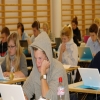BBC visited this week Greve Gymnasium to show how Danish high school students now have the opportunity to use the Internet for the exam. It is a story that has been brought on several of the English media group TV channels, web sites and radio stations. Nærum Gymnasium is one of the other high schools where students can use the internet for the exam. Here, students are no longer taken for cheating if they click through to Google, Facebook or Wikipedia in Danish, social science or mathematics exam. Currently implementing Ministry of Education trial of examination papers with Internet access in eight colleges and six trade colleges in the subjects Danish, mathematics and social studies as well as marketing, corporate finance and international economics. It is planned that all colleges should have exams in the subjects with access to the Internet from 2011.
Googler background information
Two 3-g-classes from Nærum Gymnasium tried their hand at the digital exam form since the October 30 were written test in Danish. In one of the tasks the students had to analyze and interpret a short film by Alexander Kølpin. With Internet access, students can for example click through to Google or Wikipedia and find background information about Alexander Kølpin. The task should be related to relevant professional objectives can be better achieved with Internet access than without. Moreover, the job is constructed so that, for example, contains simple questions with simple answers, but consists of more complex and coherent questions. Danish teacher at Nærum Gymnasium Gunvor Aggergaard Mikkelsen sees it as a natural and positive development that students now have access to the internet during exams. "With this kind of exam you pull reality into school. Students use the various digital reference works when the daily doing their homework at home in the room, so why should we not do the exam as realistic as possible? "She says.
Is aware of cheating
The risk of fraud is present when students have direct access to all sorts of digital encyclopedias. But with an OCR program will trickery be discovered. Student submissions will be run through the program, which reacts if it recognizes student text from the Internet. "We are aware of the cheating. Text recognition program turns out if it recognizes four words in the same order as a text on the Internet. And then the students do not communicate with each other. Chat and e-mail correspondence is banned, and it will be discovered, they are naturally expelled, "says Gunvor Aggergaard Mikkelsen.
Denmark has IT in the lead
Access to the Internet at the exam is not known elsewhere in the world. Steen Lassen, who is project manager for the study, brands lot of interest from other countries. The interest has resulted in a good number of foreign invitations Steen Lassen to contribute to conferences. "In Denmark we have a long tradition, even before the use of IT to create exam papers that more tests understanding than rote learning. We would rather have students to apply the knowledge they have, rather than simply repeating it. This way of thinking tasks makes it obvious to use it on a daily basis and for the exam, "says Steen Lassen and continues:" This exam form also means that we can make more realistic and complex tasks. The limitation of the current projects has been that the information retrieval has not been possible even if it is a major university preparatory skills to search, evaluate and present information. By opening access to the Internet during written exams, we can also get the dimension and the correspondence between the daily teaching and examination. "
Students delighted access
Back at Nærum Gymnasium sits Martin Hoffmann, Kamilla Hilsbo and Magnus Vinther and breathing out after a five-hour long Danish exam. They agree that access to the Internet is a professional advantage. "In my job I should write an article about the energy company Vattenfall's climate campaign. Here I used the Internet to find information about Vattenfall's composition and structure, just as I would have done if I was at home. Access makes that task responses become more perspective, because with this trial is legal to click through to all types of information, "says Martin Hoffmann. After the final exam with access to the Internet in June 2010 take the Ministry of Education decision on the continuation of the trial and possible expansion to other subjects.
Source: Ministry of Education 


